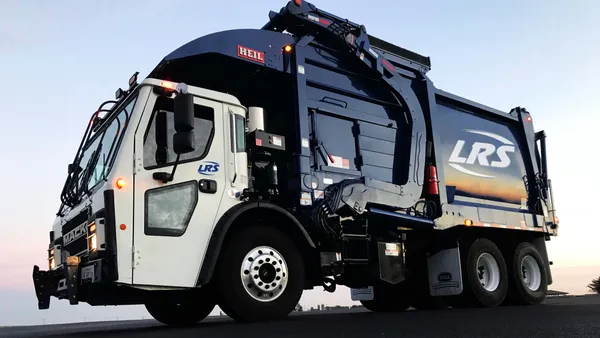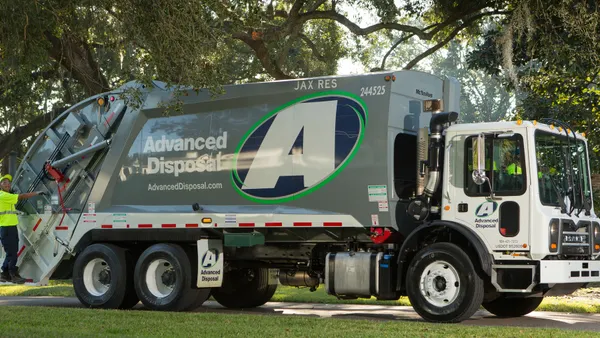Dive Brief:
- The San Diego City Council recently voted down a proposal to establish exclusive commercial waste zones within the California city's existing franchise system, as first reported by KPBS. According to a review of the proposal from a team led by R3 Consulting Group this could have resulted in $2.8 million worth of annual savings and an estimated 20% reduction in vehicle miles traveled.
- The San Diego County Disposal Association lobbied against going exclusive and staff from the Environmental Services Department (ESD) ultimately supported an alternate approach. Instead of establishing new 10-year contracts in 2024 (with the option to extend), the council approved an amendment to keep the current agreements through 2024, with one-year extensions after that.
- ESD has secured multiple new commitments in exchange, including regular meetings at the city's discretion to evaluate waste diversion requirements. Franchise fees will increase by $1 in 2019 and 2022. Alternative fuel requirements will kick in for all packer trucks in 2025 and roll-offs by 2028. An estimated 60% of the current fleets currently run on "clean fuel."
Dive Insight:
Transition challenges with the recently established exclusive system in Los Angeles were cited as a reason for pause by both council members and city staff — along with the fact that any new system couldn't take effect until 2024 due to state law. While the desired mileage reductions may now be off the table, ESD staff view this as a win because the city secured key progress in other areas that likely wouldn't have been possible otherwise.
This does mean San Diego will still be the only one in its eponymous county to not have an exclusive arrangement, but the local market is also more highly regulated than the average U.S. city. Haulers are required to hit a 50% diversion rate target by 2020 which could increase 5% every five years to help achieve the city's 2040 "zero waste" target. Under the contract amendment it's possible those targets could shift, as the consulting team estimates about 39% of diverted tonnage is currently being affected by market uncertainty that was initiated by China.
These companies also pay franchise fees of $15 per ton for Class I companies and $16 for Class II, on top of an $11 per ton fee for state law AB 939. San Diego established franchise agreements back in 1996 with 21 companies and that list has been largely the same ever since, with the exception of consolidation. Three Class I companies — Waste Management, Republic Services and EDCO Disposal — now control 15 agreements and handle an estimated 90% of the tonnage.
Those first two companies have expressed an affinity for exclusive contracts elsewhere, and are among the service providers currently operating in Los Angeles, so the fact that they didn't push for them in this case would seem to mark a change of course. Such systems are often seen as beneficial to larger companies, and the R3 report found that an exclusive system would have "an unavoidable adverse impact on smaller franchised haulers" by further limiting their market share under the envisioned set-up of three to five zones.
Customer rates were also projected to potentially increase, though the consultants made it clear that is expected to happen anyway. The specter of rate increases has been a key point of contention in Los Angeles, as well as the newly launched non-exclusive collection system in St. Paul, Minnesota.
New York, as initially reported by Waste Dive in April, is also pursuing its own version of non-exclusive system, allowing a set number of haulers to operate in various zones. Pressure on small haulers and pricing are both still common concerns in that scenario. The city's Department of Sanitation has maintained prices won't go up significantly, and haulers operate under a rate cap in the current structure. One of the core talking points for New York's own ambitions is also a potential reduction in vehicle miles traveled, though the fact that cities such as San Diego are willing to forego that limit in the near-term for other benefits is an example of how negotiations can often play out differently than expected.











